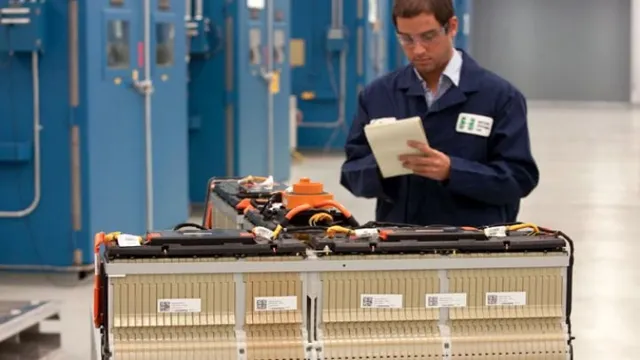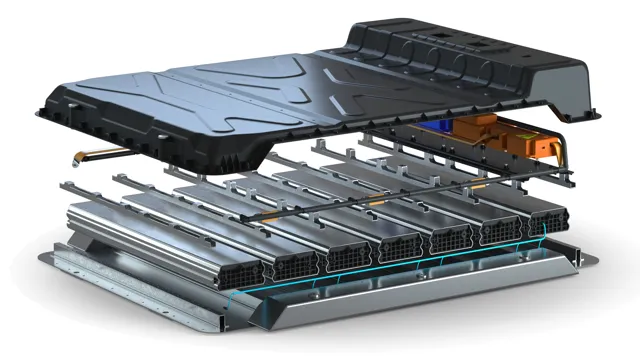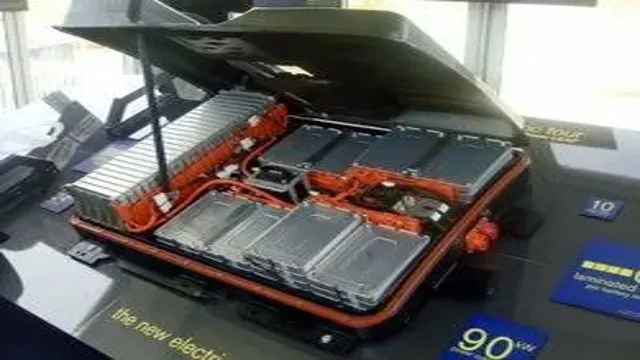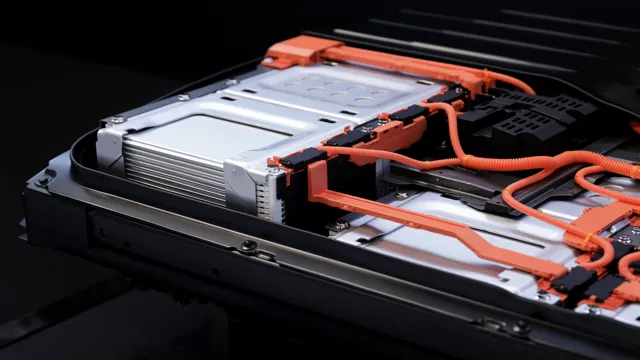Rev Up Your Drive: The Best Batteries for Optimum Performance in Electric Cars
When it comes to electric cars, there’s one component that can make or break their performance: the battery. Just like the heart of a human body, the battery is the power source that keeps the electric car moving. But how does it work? And what makes one battery better than another? In this article, we will dive into the world of powering performance electric cars and explore the technology behind their batteries.
Whether you’re an automotive enthusiast or simply curious about the future of transportation, join us as we uncover the secrets of these high-tech powerhouses.
Why Batteries Matter for Performance Electric Cars
Batteries are an essential component of any performance electric car. The quality and capacity of the battery pack directly affect the vehicle’s power, range, and acceleration. Lithium-ion batteries are the most common in high-performance electric cars, as they have a higher energy density, charge faster, and offer better performance.
Additionally, battery management systems are essential to ensure the battery pack’s longevity and optimize charging times. The size and weight of the battery pack also make a significant impact on the car’s handling and balance. Manufacturers are continually striving to improve battery technology to overcome the current electric car’s limitations and create even more efficient and powerful machines.
Investing in battery technology is essential for performance electric cars, and advancements in this field will continue to push the limits of what these vehicles can achieve.
Maximizing Speed and Acceleration
Electric cars are becoming increasingly popular due to their eco-friendliness and their ability to provide a smooth and quiet ride. However, when it comes to performance electric cars, the type of battery used is just as important as the motor and other components. Lithium-ion batteries are the industry standard, and they are designed to maximize speed and acceleration.
The reason for this is due to the fact that lithium-ion batteries are capable of discharging large amounts of power very quickly, making them ideal for high-performance electric vehicles. Think of it like a runner who needs a burst of energy to sprint the last 100 meters of a race. Lithium-ion batteries provide that burst of energy for electric cars, resulting in faster acceleration and top speeds.
Additionally, lithium-ion batteries are lightweight, which can reduce the overall weight of the car and improve handling. So, when it comes to performance electric cars, the type of battery used can make all the difference in the world.
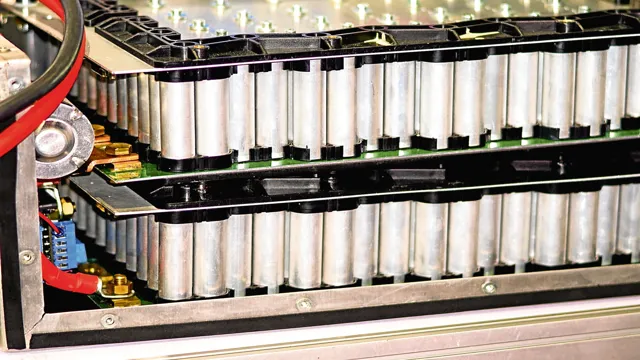
Increasing Range and Efficiency
As electric cars become more popular, the need for increased range and efficiency becomes more important. One key factor in achieving this is the battery. The type and quality of the battery used in an electric car can greatly impact its performance, including its range and efficiency.
High-quality batteries with higher energy density can provide longer range and better efficiency, allowing drivers to go further on a single charge and save money on energy costs. Additionally, newer battery technologies such as solid-state batteries and lithium-sulfur batteries hold promise for even further improvements in range and efficiency. So, when it comes to performance electric cars, investing in a high-quality battery is essential.
Types of Batteries for Performance Electric Cars
When it comes to performance electric cars, the right type of battery can make all the difference. Lithium-ion batteries are the most common type of battery used in electric cars due to their high energy density, long lifespan, and low maintenance. However, within the lithium-ion family, there are different chemistries that can impact performance.
For example, NMC batteries offer a balance between energy density and power output, while LFP batteries excel in safety and lifespan. Some high-performance electric cars utilize solid-state batteries, which offer even higher energy density and faster charging times, but are currently more expensive to produce. Ultimately, the type of battery used in a performance electric car will depend on factors such as cost, weight, and performance goals.
Lithium-Ion Batteries
Lithium-Ion Batteries If you’re looking for high-performance electric cars, you’re in luck because there are several types of batteries available to give you the boost you need. Lithium-ion batteries are currently the most popular option in the market, especially for performance electric cars. These batteries offer a high energy density, which means they can store more energy in less space.
Additionally, they have a low self-discharge rate, which means they can retain their charge for a longer time. With these two features combined, lithium-ion batteries can deliver more power for a longer duration, making them ideal for high-performance vehicles. So, if you’re looking for an electric car that can go the extra mile and deliver the speed and power you need, look no further than those featuring lithium-ion batteries.
Solid State Batteries
Solid State Batteries When it comes to performance electric cars, the type of battery used is crucial for the vehicle’s performance. Solid state batteries are a great option for electric cars because they use a solid electrolyte rather than a liquid one. This allows for higher energy density, longer cycle life, and improved safety.
Unlike traditional lithium-ion batteries, solid-state batteries also have the potential to charge much faster and operate efficiently in extreme temperatures. It’s clear that solid state batteries are the future of electric vehicle technology, and automakers are already investing in their development. As this technology continues to evolve, we can expect to see even more advancements in performance, range, and efficiency for electric cars.
Graphene Batteries
When it comes to high-performance electric cars, the type of battery used can make all the difference. Lithium-ion batteries have been the standard for years, but recently, graphene batteries have been making waves in the industry. These batteries are made from a special form of carbon that is incredibly light and strong, with excellent conductivity.
Not only can they hold more energy than traditional lithium-ion batteries, but they charge faster and last longer. Graphene batteries also have the potential to be much safer, as they are less likely to overheat or catch fire. All of these factors make graphene batteries a promising option for the future of electric cars.
Choosing the Right Battery for Your Car
When it comes to high-performance electric cars, choosing the right battery is critical. These vehicles demand a power source that can deliver the necessary energy for fast acceleration and sustained high-speed driving. Lithium-ion batteries are the most common type used in performance electric cars due to their high energy density and low weight.
However, not all lithium-ion batteries are created equal, with variations in chemistry and construction affecting their performance capabilities. It’s essential to consider factors such as voltage, capacity, and discharge rate when selecting a battery for your car. Additionally, it’s important to ensure that the battery’s size and weight are suitable for your vehicle’s power requirements.
With the right battery choice, you can ensure that your electric car delivers top-notch performance and a satisfying driving experience.
Considerations for Speed and Range
When it comes to electric cars, choosing the right battery is crucial to ensure optimal speed and range. The first thing to consider is the battery’s capacity, which is measured in kilowatt-hours (kWh). The higher the kWh, the more energy the battery can store, resulting in longer range.
However, higher capacity batteries can also be heavier and more expensive. It’s essential to find the right balance between range and cost, depending on your individual needs. Another consideration is the battery’s chemistry.
Lithium-ion batteries are currently the most popular for electric cars due to their high energy density and long life span. Other factors to consider include charging time, regenerative braking, and overall durability. By choosing the right battery, you can ensure that your electric car performs well and meets your specific needs.
Factors to Keep in Mind When Choosing a Battery
Choosing the right battery for your car can be a daunting task, so it’s important to keep a few factors in mind. Firstly, it’s essential to pick a battery that is compatible with your car’s make and model, as different cars have different power needs. Secondly, consider the battery’s cold cranking amps (CCA) rating, which indicates the level of power the battery can produce in cold weather.
Additionally, the battery’s reserve capacity (RC) is also a crucial factor as it indicates how long the battery can provide power if the alternator fails. Another crucial point to keep in mind is the battery’s warranty, as buying a battery with a longer warranty guarantees peace of mind. Lastly, consider the battery’s maintenance needs, as maintenance-free batteries are more convenient but do not last as long as maintained batteries.
By keeping these factors in mind, you can choose the right battery for your car that not only meets your power needs but is also durable and reliable.
Investing in High-Performance Electric Car Batteries
When it comes to investing in high-performance electric cars, the quality and capacity of the battery are key factors to consider. Battery technology has come a long way in recent years, and advances in battery design have resulted in much more efficient, longer-lasting batteries that are ideally suited for high-performance electric cars. To get the most out of your electric car, it’s important to invest in a battery that is specifically designed for high performance.
These batteries can provide higher energy densities, faster charging times, and longer lifetimes, making them an ideal choice for anyone looking to get the most out of their electric car. Battery technology continues to evolve, and as more and more people make the switch to electric cars, we can expect even more exciting advances in battery design in the years to come. So if you want to stay ahead of the curve, investing in high-performance electric car batteries is a smart move.
Conclusion
In conclusion, batteries are the lifeblood of electric cars and play a critical role in their overall performance. Without the high-performance batteries that we have today, the idea of a reliable and practical electric car would still be just a pipe dream. These batteries not only enable the cars to drive hundreds of miles on a single charge, but they also provide the necessary power and performance that drivers demand.
From range anxiety to zero-emissions, batteries are the key to unlocking the full potential of electric cars. So, if you want to go the distance in style with minimal environmental impact, it’s time to invest in some top-notch batteries for your performance electric car!”
FAQs
Are there any specific types of batteries recommended for performance electric cars?
Yes, high-performance lithium-ion batteries are recommended for electric cars that prioritize speed and acceleration.
What is the average lifespan of batteries used in performance electric cars?
The average lifespan of lithium-ion batteries used in performance electric cars is around 8-10 years or 100,000-150,000 miles, depending on usage and maintenance.
Can I upgrade the batteries in my current electric car to improve its performance?
It depends on the make and model of your car, as well as the type of battery it uses. It’s best to consult with a professional mechanic or the manufacturer to determine if an upgrade is possible and beneficial.
How do I properly maintain the batteries in my performance electric car?
Regular charging, avoiding extreme temperatures, and minimizing frequent full discharges can help prolong the life and performance of your car’s batteries. It’s also important to follow the manufacturer’s recommended maintenance schedule.

